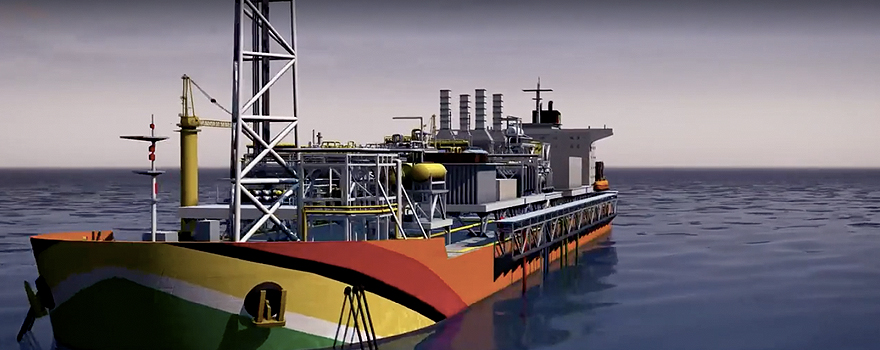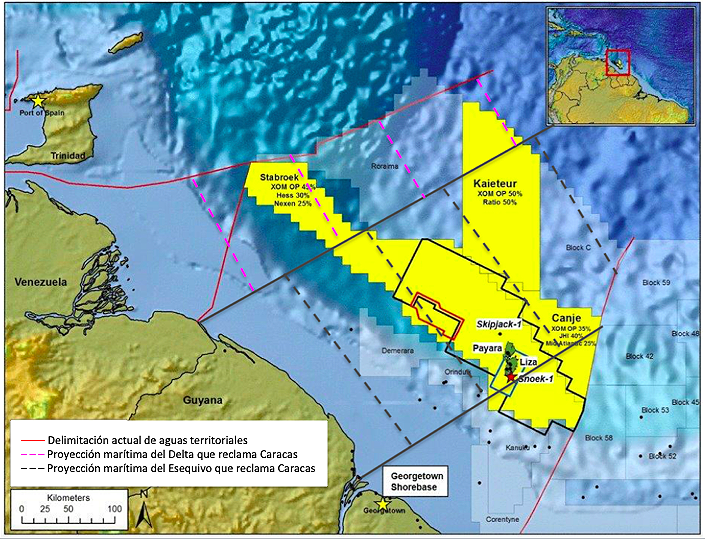One of the poorest countries in the Americas may become the world's largest oil producer per capita, disrupting the relationship with its neighbors.
Promising oil discoveries in Guyana's waters augur greater regional relevance for this small and poor South American country. Territorial disputes between Venezuela and its neighbor, on account of the Essequivo territory that Caracas has historically claimed (more than half of Guyana's surface area), may be exacerbated by the opening of wells in deep waters that Guyana administers but over which Venezuela seeks fair international arbitration.

Image created by ExxonMobil about its exploration in Guyana's waters.
article / Ignacio Urbasos Arbeloa
Guyana has found oil deposits 193 km off its coast by the hand of ExxonMobil that can completely change the course of its Economics and its international influence. After several decades of failed attempts in the search for hydrocarbons in its subsoil and an exhaustive search since 1999, in 2015 the Liza field responded positively to seismic analysis showing subsequently abundant oil reserves at a depth of 1,900 meters offshore. At the moment estimates speak of 3.2 billion barrels of recoverable oil to be found in the Guiana Basin, which extends to Suriname, another country with a promising oil future. Companies such as Total, Repsol or Anadarko have already obtained exploration rights in the different blocks offered so far by the Guyanese government, however it is the Stabroek Block, exploited by Exxon (45%), Hess (30%) and the Chinese CNOOC (25%), which will be the first to start producing, in 2020.
Expected to reach 700,000 barrels per day by 2025, this is the largest finding of the lustrum in deepwater globally and one of the most valuable additions to conventional oil production. The crude is Pass for middle distillates, precisely what Gulf of Mexico refiners are looking for in a market saturated by light crude from fracking. If agreement is to optimistic estimates, by 2025 this impoverished country of about 700,000 people would surpass OPEC member Ecuador in oil production, making it the world's largest producer of barrels per capita (ahead of current leader Kuwait, which has a production of 3.15 million barrels per day and 4.1 million inhabitants). Production costs per barrel are estimated at $26 considering taxes, so profits are expected to be abundant in practically any future scenario (currently the barrel of WTI is around $50), making Guyana one of the great attractions in the oil industry at the moment. Prospecting led by Exxon, a company that already dominates exploitation in the so-called deepwaters, had in 2018 fees hit rates close to 80%, which has generated enormous expectation in a sector accustomed to fees of 25%.
The positive impact that this finding will have for the Guyanese Economics is evident, although it is not Exempt of challenges, given the high levels of corruption or a bureaucracy and political class inexperienced for negotiations at this level. The IMF, which is advising Guyana, has already recommended freezing further negotiations until the tax system is reformed and the country's bureaucratic capacity is improved. The same agency has estimated a 28% GDP growth for Guyana by 2020, a historic figure for a Economics whose exports are based on rice, sugar cane and gold. The government is already designing an institutional framework to manage oil tax revenues and cushion their impact on other sectors. Among the proposals is the creation of a sovereign wealth fund similar to those of Norway, Qatar or the United Arab Emirates, which could become effective this year with partnership of experts from the Commonwealth, to which the country belongs.
Historic dispute with Venezuela
These new discoveries, however, increase the tension with Venezuela, which maintains a territorial dispute over 70% of the Guyanese territory, the Guayana Esequiba belonging to the Captaincy General of Venezuela during the Spanish Empire. The disputed territory was later de facto colonized by the British Empire when the British took control over the Dutch territories of Guyana in 1814. In 1899 an international tribunal ruled unanimously in favor of the United Kingdom against Venezuelan claims. However, later revelations demonstrated the existence of serious elements of corruption in the judicial process, making the award "null and void" (non-existent) in 1962. In 1966 the United Kingdom, as representative of British Guyana, and Venezuela signed the Genevaagreement , which established the commitment to reach an agreement agreement: the Port of Spain protocol of 1970, which froze negotiations for 12 years. After the end of this period, Venezuela demanded Guyana to return to direct negotiations, and in accordance with the United Nations Charter, the diplomatic formula of good offices has been agreed upon and remains in force to this day, without any significant progress having been made. Since Guyana's independence in 1966, Venezuela promoted an indigenous separatist movement in the region, Rupununi, which was harshly repressed by Georgetown, setting a precedent of military tension on the border.
Although a formal agreement has never been reached on the territorial dispute, the arrival of the socialist People's Progressive Party (PPP) to government in Guyana in 1992 and the electoral victory of Hugo Chávez in 1999 in Venezuela ideologically aligned both countries, which allowed them to reach Degrees of unprecedented cooperation during the first decade of the 21st century. In the framework of this golden era, Guyana participated between 2007 and 2015 in the Venezuelan Petrocaribe initiative, receiving some 25,000 barrels per day of oil and derivatives, which constituted 50% of its consumption, in exchange for rice valued on market price. On the other hand, Guyana supported Venezuela's candidacy to the United Nations Security committee in 2006 in exchange for an express promise by Caracas not to use the privileged position it temporarily acquired in the territorial dispute. An important precedent was the declaration of Hugo Chávez in 2004 of not opposing Guyana "to unilaterally grant concessions and contracts to multinational companies, as long as this favors the development of the region". In spite of the existence of unfriendly acts between the two States during this period, the vital importance that the Venezuelan anti-imperialist foreign policy gave to the Caribbean during Chávez's mandate, obliged him to treat topic from the most absolute moderation to avoid a disagreement with CARICOM and to maintain Guyana's support in the OAS.
|

Map of Guyana's oil exploitation blocks (in yellow), with the delimitation of territorial waters and Venezuela's claims.
|
New tensions
As a result of the oil discoveries, the historic territorial dispute with Venezuela has returned to the forefront. A change of sign in the Georgetown government has also contributed to this. The 2015 elections brought to power in Guyana the A Partnership for National Unity, led by former military officer David Granger. This is a multi-ethnic coalition that could be described as center-right and with less ideological sympathies towards neighboring Venezuela than those professed by the previous president, Bharrat Jagdeo of the PPP. At the end of 2018 there was an escalation of tension, following the seizure on December 23 by the Bolivarian National Navy of two Guyanese-flagged vessels belonging to ExxonMobil that were prospecting in the area and which, of agreement to the version of the Government of Nicolás Maduro, had entered Venezuelan waters. The international response was not long in coming and the United States urged Venezuela to "respect international law and the sovereignty of its neighbors". Precisely one of the most complex issues in the territorial dispute is the projection of the waters of each country. The position defended by Venezuela is to draw the maritime limits of agreement to the projection of the delta of the Orinoco River, as opposed to the Guyanese position which draws the line in a manner favorable to its territorial interests. Although this was a secondary element in the territorial dispute, the economic potential of these waters places them at the center of the discussion.
To all this is added the declaration of the group of Lima, of which Guyana is part, not to recognize the May elections in Venezuela and to threaten to economically sanction the country (although, to date, it has not recognized the opposition candidate Juan Guaidó as interim president). The international ostracism of the Bolivarian Republic has allowed Guyana to obtain important diplomatic support from the aforementioned group of Lima, CARICOM and the United States in relation to its international dispute and the detention of the Exxon ships.
result The future of relations between Venezuela and Guyana depends to some extent on the outcome of the future elections in March in the latter country, which will pit the hitherto president, David Granger, recently ousted from power by means of a motion of censure, against the leader of the PPP, Bharrat Jagdeo, whose party has maintained the best relations with Chavista Venezuela. The no-confidence motion is a historic milestone for the South American country, which will have to prove its social cohesion and political stability amidst geopolitical tensions and an international investment community that is watching closely the development of events.
Increased defense revenues
Georgetown, for the moment, limits itself to diplomatic action to defend its territorial sovereignty, but documents of the Guyanese Defense Forces prior to the oil discoveries already identified the need to develop military capabilities in case such resources were found in the country. According to Exxon's estimates, agreement , Guyana would earn 16 billion dollars a year from 2020, which would increase the military expense , currently at around 1% of the GDP. The Army of the Cooperative Republic of Guyana conducted in August 2018 the largest military exercises in its history, mobilizing 1,500 troops out of an Army estimated at around 7,000. Information available about the material resources of navy and aviation show the need for quantitative and qualitative improvement. Overcoming the existing ethnic divisions between the population of Indian and African origin must be one of the priorities of the Armed Forces, which suffer from a clear under-representation of the Indian community, a cause of historical suspicion of the civil society.
At final, the Caribbean region of South America will be marked in the coming years by the economic potential of Guyana and its struggle for territorial survival in the face of Venezuela's legitimate demands. Achieving a real development of the oil industry will undoubtedly be the best armor for its future as a sovereign and independent country. The political uncertainty in Venezuela, immersed in an enormous crisis, generates the fear of a possible military escalation as an escape valve to the internal economic and political pressure against a rival that lacks the resources to face it. The capacity of Guyana's political class to manage the brutal increase in its economic resources after 2020 is still an unknown, but it is possible to imagine that the second poorest country in the Western Hemisphere will reach great heights of development if it is capable of learning from its neighbors and managing a regional context that is favorable to its national interests.
